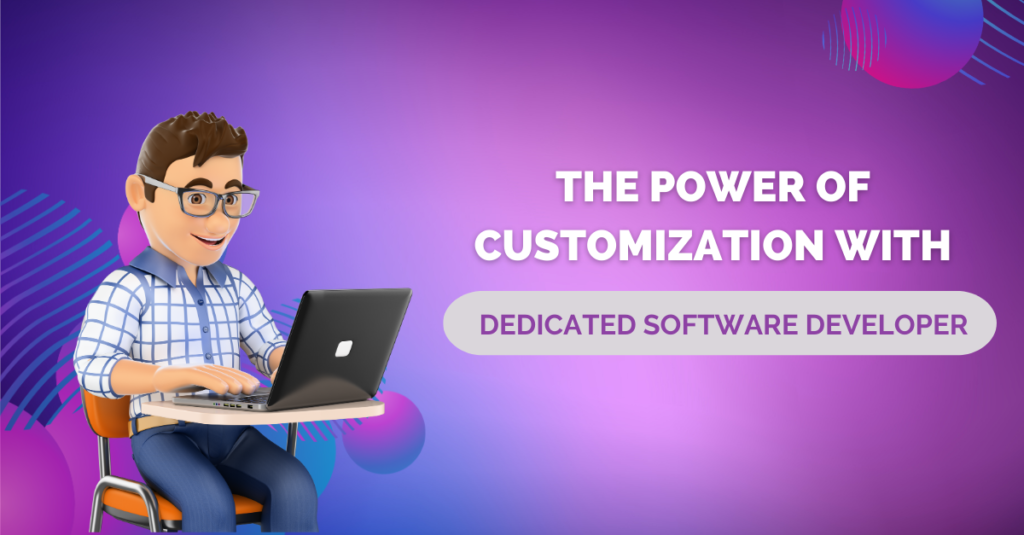
Introduction
In today’s rapidly evolving digital landscape, businesses across industries are seeking innovative ways to gain a competitive edge. One of the key factors driving success is the ability to tailor solutions to specific needs. Customization has become paramount, and a dedicated software developer can play a pivotal role in achieving tailored success. This article delves into the power of customization through collaboration with a skilled software developer and highlights the benefits it brings to businesses.
1. Understanding the Importance of Customization
In today’s dynamic business environment, generic solutions often fall short of meeting specific requirements. Tailoring solutions to address unique business needs is essential for long-term success. Customization allows businesses to have full control over their software applications, enabling them to align their operations, processes, and user experiences with their objectives.
2. The Role of a Dedicated Software Developer
A dedicated software developer serves as a crucial partner in the customization journey. They are skilled professionals who possess in-depth knowledge of programming languages, frameworks, and software development methodologies. Their primary responsibility is to understand the client’s requirements and translate them into a fully functional and customized software solution.
3. Benefits of Collaborating with a Software Developer
- Enhanced Solution Functionality
By working closely with a dedicated software developer, businesses can unlock the potential to enhance solution functionality. Off-the-shelf software often comes with limitations that can hinder optimal performance. Through customization, software developers can tailor the solution to meet specific business requirements, adding features and functionalities that align with the organization’s unique needs.
- Scalability and Flexibility
Customized software solutions offer scalability and flexibility, ensuring that businesses can adapt and grow without technological constraints. With a dedicated software developer, scalability becomes seamless, as they can design and develop the software with future growth in mind. Additionally, customization allows for the integration of third-party tools and APIs, enhancing the software’s flexibility.
- Streamlined Workflows and Efficiency
Efficiency is a critical factor in achieving success. By collaborating with a software developer, businesses can streamline their workflows and improve overall efficiency. Customized software eliminates redundant processes and automates tasks, saving time and resources. By aligning the software with specific business needs, employees can focus on core activities, leading to increased productivity.
- Improved User Experience
User experience plays a pivotal role in customer satisfaction and retention. With customization, businesses can create software solutions that deliver exceptional user experiences. A dedicated software developer can design intuitive interfaces, implement personalized features, and optimize workflows based on user preferences. This level of customization results in enhanced user engagement and loyalty.
4. Factors to Consider when Choosing a Software Developer
When selecting a software developer to collaborate with, certain factors should be taken into account to ensure a successful partnership:
- Expertise and Skillset
Evaluate the developer’s expertise and skillset in relevant programming languages, frameworks, and software development methodologies. Look for experience in similar projects to gauge their ability to deliver tailored solutions.
- Track Record and Experience
Consider the developer’s track record and experience in the industry. Review their portfolio and client testimonials to assess their competence and reliability.
- Communication and Collaboration
Effective communication and collaboration are vital for a successful partnership. Choose a software developer who actively listens, understands your requirements, and communicates effectively throughout the development process.
5. The Collaborative Process with a Software Developer
Collaborating with a software developer involves a structured process that ensures effective development and delivery of a customized solution. The following steps outline the collaborative journey:
- Discovery and Requirement Gathering
The software developer begins by thoroughly understanding the client’s business objectives, workflows, and pain points. Through extensive requirement gathering, they identify the specific features and functionalities required to address the client’s unique needs.
- Design and Prototyping
Based on the gathered requirements, the software developer creates a design and develops prototypes that illustrate the envisioned solution. This stage involves feedback and iteration to refine the design and align it with the client’s expectations.
- Development and Testing
Once the design is approved, the software developer proceeds with the development phase. They write clean, maintainable code and conduct rigorous testing to ensure the solution’s stability and functionality.
- Deployment and Maintenance
After successful testing, the software developer deploys the customized solution. They provide comprehensive support and maintenance services to address any issues that may arise post-deployment.
6. Conclusion
In the era of customization, a partnership with a dedicated software developer holds immense power for businesses. By leveraging their expertise, businesses can unlock the full potential of tailored solutions, offering enhanced functionality, scalability, efficiency, and improved user experiences. The collaborative process with a software developer ensures that specific requirements are met, resulting in long-term success and a competitive advantage.
